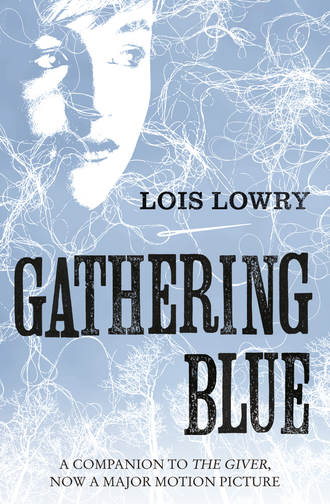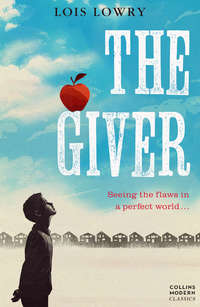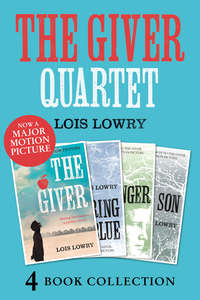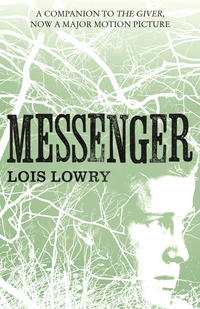
Полная версия
Gathering Blue
“Kira,” he said, looking toward her, “demonstrate your flaw for the Council of Guardians. Let us see you walk. Go to the door and back.”
It was cruel of him, she thought. They all knew about her twisted leg. Why did she have to do this in front of them, to submit to their humiliating stares? For a moment she was tempted to refuse, or at least to argue. But the stakes were too high. This was not a tykes’ game, where arguing and fighting were expected. This was what would determine her future, or whether she had a future. Kira sighed and turned. She leaned on her stick and walked slowly to the door. Biting her lip, she dragged her aching leg step by step, and felt Vandara’s contemptuous eyes on her back.
At the door Kira turned and came slowly back to her place. Pain started in her foot and seared through her twisted leg. She longed to sit.
“She does drag her leg, and she is slow,” Jamison pointed out needlessly. “I concede those points.
“Yet her work at the weaving shed is competent. She goes each day for regular hours, and she is never late. The women there value her help.
“Does she eat a lot?” he asked, and chuckled. “I think not. Look how thin she is. Her weight refutes that accusation.
“But I suspect she is hungry now,” he said. “I am. I suggest we take a break for a meal.”
The chief guardian stood. “Do you wish to speak?” he asked Kira for the third time. For the third time she shook her head no. She felt terribly tired.
“You may sit,” he directed Kira and Vandara. “Food will be brought.”
Gratefully Kira lowered herself onto the nearby bench. She rubbed her throbbing leg with one hand. Across the aisle, she saw Vandara bow—I forgot again! I should have bowed!—and then sit, stony-faced.
The chief guardian glanced down at his own stack of papers. “There are five more charges,” he said. “We will deal with them and make a decision after the meal.”
Food appeared, brought by the door guard. A plate was handed to Kira. She saw and smelled roasted chicken and warm, crusty bread scattered with seeds. She had not eaten anything but raw vegetables in several days, and had not tasted chicken in many months. But she could still hear Vandara’s voice, shrill with vindictive accusation: “She eats a lot.”
Fearful of the consequences if she showed her ravenous hunger, Kira willed herself to nibble at the tempting meal. Then she set the half-empty plate aside and sipped water from the cup they had brought. Tired, hungry still, and frightened, she stroked the scrap of cloth in her pocket, and waited for the next round of accusations.
* * *
The twelve guardians went elsewhere, leaving through a side door, probably to a private eating place. After a while guards came to take her food tray away and announced a rest period. The trial would resume when the bell rang twice, they told her. Vandara rose and left the room. Kira waited for a moment. Then she made her way to the door of the Council Edifice, walked through the long hall, and went outside.
The world was unchanged. People came and went, working at various jobs, arguing loudly. She heard shrill voices at the marketplace: women shouting outrage at the prices, vendors shouting in reply. Babies cried, tykes fought, scavenger dogs growled and menaced each other as they vied for dropped scraps.
The boy Matt appeared, running past with some others. When he saw Kira he hesitated, then stopped and came back.
“We got saplings for you,” he whispered. “Me and some other tykes. We put ‘em in a pile. Later we be starting your cott if you want.” Then he paused, curious. “If you need a cott, that is. What be happening in there?”
So Matt knew about the trial. No surprise. The boy seemed to know everything that was happening in the village. Kira shrugged with feigned nonchalance. She didn’t want to let him know how frightened she was. “A lot of talking,” she told the boy.
“And she be in there? Her with the horrid scar?”
Kira knew whom he meant. “Yes. She’s the accuser.”
“She’s hard, that Vandara. She killed her own tyke, they say. Made him eat the oleander, they say. Sat with him and held his head till he et it, though he didn’t want to.”
Kira had heard the story. “It was judged an accident,” she reminded Matt, though she had her doubts. “Other tykes have eaten the oleander. It’s a danger, having a poisonous plant grow wild everywhere. They ought to pull it all up, not leave it where the tykes can get at it.”
Matt shook his head. “We be needing it there to teach us,” he pointed out. “Me mum, she slapped at me when I touched it. Slapped my head around so horrid hard I thought my neck would crack. It’s how I learnt about the oleander.”
“Well, the Council of Guardians judged Vandara and said she didn’t,” Kira said again.
“She’s a hard one, anyways. They say because of the horrid wound. Pain be making her cruel.”
Pain made me proud, Kira thought but didn’t say.
“When you be finish?”
“Later today.”
“We’ll work on your cott. Some of my mates’ll help.”
“Thank you, Matt,” Kira said. “You’re a good friend.”
He made a face, embarrassed. “You be needing a cott.” He turned to run after the other boys. “And you tell us the stories, after all. You be needing a place for that.”
Kira smiled, watching him scamper off. The bell at the top of the Council Edifice rang twice. She turned to reenter the building.
* * *
“‘She was kept, against the rules, because her grandfather was still alive and had power. But he is long gone.’”
Jamison read the next accusation on the list.
They had allowed her to sit for the afternoon session. And they told Vandara to sit too. Kira was grateful. If Vandara had stood, she would have forced herself to ignore the pain in her leg and stand as well.
Again the guardian who was her defender reiterated that exceptions could be made. By now, frightening though the accusations were, the repetition was tiresome. Kira tried to stay alert. With her hand in her pocket, she fingered the small scrap of woven cloth and pictured its colors in her mind.
The community cloth was drab, all no-color; the formless shifts and trousers worn by the people were woven and stitched for protection against the sudden occasional rain, thorn scratch, or poison berry. The usual village fabric was not decorated.
But Kira’s mother had known the art of dye. It was from her stained hands that the colored threads used for rare ornamentation were produced. The robe worn each year by the Singer when he performed the Ruin Song was richly embroidered. The intricate scenes on it had been there for centuries, and the robe had been worn by each Singer and passed from one to the next. Once, many years before, Katrina had been asked to replace a few threads that had torn loose. Kira was only a small tyke then, but she remembered standing in the cott’s shadowed corner when a guardian brought the fabulous robe and waited while her mother made the small repair. She remembered watching, fascinated, as her mother pushed a bone needle with thick colorful thread through the fabric; gradually a bright gold replaced the small frayed spot on one sleeve. Then they had taken the robe away again.
At that year’s Gathering, Kira remembered, both she and her mother had peered from their seats at the stage, trying to find the repaired place as the Singer moved his arms in gestures during the Song. But they were too far away, and the repaired spot was too small.
Each year that followed, they had brought the ancient robe again to her mother for small repairs.
“One day my daughter will be able to do this,” Katrina had said one year to the guardian. “Look what she has done!” she said and showed him the scrap that Kira had just completed, the one that had composed itself so magically in her fingers. “She has a skill far greater than mine.”
Kira had stood silently, embarrassed but proud, as the guardian examined the threading she had done. He made no comment, simply nodded and returned the small piece to her. But his eyes had been bright with interest, she could see. Each year following, he had asked to see her work.
Kira always stood at her mother’s side, never touching the fragile ancient cloth, marveling each time at the rich hues that told the history of the world. Golds and reds and browns. And here and there, faded pale, almost reduced to white, there had once been blue. Her mother showed her the faded places that remained of it.
Her mother did not know how to make blue. Sometimes they talked of it, Kira and Katrina, looking at the huge upturned bowl of sky above their world. “If only I could make blue,” her mother said. “I’ve heard that somewhere there is a special plant.” She looked out at her own garden, thick with the flowers and shoots from which she could create the golds and greens and pinks, and shook her head in yearning for the one color she could not create.
Now her mother was dead.
Now her mother is dead.
Kira startled herself out of the daydreamed memory. Someone was saying those words. She made herself listen.
“‘—and now her mother is dead. There is even reason to think that her mother may have carried an illness that will endanger others—
“‘—and the women need the space where their cott was. There is no room for this useless girl. She can’t marry. No one wants a cripple. She takes up space, and food, and she causes problems with the discipline of the tykes, telling them stories, teaching them games so that they make noise and disrupt the work.’”
It dragged on. The repetitions of Vandara’s accusations were recited, and the defender again and again reiterated the amendment that said exceptions could be made.
But Kira noted a change of tone. It was subtle, but she perceived a difference. Something had taken place among the Council of Guardians when the members had withdrawn during lunch. She saw Vandara shift uneasily in her seat and knew that her accuser noticed the difference too.
Kira, clutching the cloth talisman in her pocket, became aware suddenly that its warmth and comfort had returned.
During her infrequent leisure times, Kira often experimented with colored bits of threadings, feeling the excitement in her fingers as her surprising skill grew. She used bits of discarded woven cloth from the weaving shed. It was not a violation. She had asked permission to take the scraps to her cott.
Sometimes, pleased with what she had done, she showed her work to her mother and received a proud, quick smile of approval. But more often her efforts were disappointments, the uneven products of a girl still learning; usually she threw her experiments away.
This one, the one she held now in the nervous fingers of her right hand, she had done as her mother lay ill. Seated helplessly by the side of the dying woman, Kira leaned forward again and again to hold a container of water to her mother’s lips. She smoothed her mother’s hair, rubbed her cold feet, and held the trembling hands, knowing there was nothing more she could do. While her mother slept restlessly, Kira sorted the dyed threads in her basket and began to weave them into the cloth scrap with a bone needle. It soothed her to do so, and passed the time.
The threads began to sing to her. Not a song of words or tones, but a pulsing, a quivering in her hands as if they had life. For the first time, her fingers did not direct the threads, but followed where they led. She was able to close her eyes and simply feel the needle move through the fabric, pulled by the urgent, vibrating threads.
When her mother murmured, Kira leaned forward with the water container and moistened the dry lips. Only then did she look down at the small strip of material in her lap. It was radiant. Despite the dim light in the cott—it was night-start by then—the golds and reds pulsated as if the morning sun itself had slid and twisted its rays into the cloth. The brilliant threads crisscrossed in an intricate pattern of loops and knots that Kira had never seen before, that she could not have created, that she had never known or heard described.
When her mother’s eyes opened for a final time, Kira had held the vibrant piece of fabric so that the dying woman could see. Words were beyond Katrina by then. But she smiled.
Now, secret in her hand, the cloth seemed to speak a silent, pulsing message to Kira. It told her there was danger still. But it told her also that she was to be saved.

KIRA NOTICED FOR the first time that a large box had been placed on the floor behind the seats of the Council of Guardians.
It had not been there before the lunchtime break.
As she and Vandara watched, one of the guards, responding to a nod from the chief guardian, lifted the box to the table and raised its lid. Her defender, Jamison, removed and unfolded something that she recognized immediately.
“The Singer’s robe!” Kira spoke aloud in delight.
“This has no relevance,” Vandara muttered. But she too was leaning forward to see.
The magnificent robe was laid out on the table in display. Ordinarily it was seen only once a year, at the time when the village gathered to hear the Ruin Song, the lengthy history of their people. Most citizens, crowded into the auditorium for the occasion, saw the Singer’s robe only from a distance; they shoved and pushed, trying to nudge closer for a look.
But Kira knew the robe well from watching her mother’s meticulous work on it each year. A guardian had always stood nearby, attentive. Warned not to touch, Kira had watched, marveling at her mother’s skill, at her ability to choose just the right shade.
There, on the left shoulder! Kira remembered that spot, where just last year some threads had pulled and torn and her mother had carefully coaxed the broken threads free. Then she had selected pale pinks, slightly darker roses, and other colors darkening to crimson, each hue only a hint deeper than the one before; and she had stitched them into place, blending them flawlessly into the edges of the elaborate design.
Jamison watched Kira as she remembered. Then he said, “Your mother had been teaching you the art.”
Kira nodded. “Since I was small,” she acknowledged aloud.
“Your mother was a skilled worker. Her dyes were steadfast. They have not faded.”
“She was careful,” Kira said, “and thorough.”
“We are told that your skill is greater than hers.”
So they knew. “I still have much to learn,” Kira said.
“And she taught you the coloring, as well as the stitches?”
Kira nodded because she knew he expected her to. But it was not exactly true. Her mother had planned to teach her the art of the dyes, but the time had not yet come before the illness struck. She tried to be honest in her answer. “She was beginning to teach me,” Kira said. “She told me that she had been taught by a woman named Annabel.”
“Annabella now,” Jamison said.
Kira was startled. “She is still alive? And four syllables?”
“She is very old. Her sight is somewhat diminished. But she can still be used as a resource.”
Resource for what? But Kira stayed silent. The scrap in her pocket was warm against her hand.
Suddenly Vandara stood. “I request that these proceedings continue,” she said abruptly and harshly. “This is a delaying tactic on the part of the defender.”
The chief guardian rose. Around him, the other guardians, who had been murmuring among themselves, fell silent.
His voice, directed at Vandara, was not unkind. “You may go,” he said. “The proceedings are complete. We have reached our decision.”
Vandara stood silent, unmoving. She glared at him defiantly. The chief guardian nodded, and two guards moved forward to escort her from the room.
“I have a right to know your decision!” Vandara shouted, her face twisted with rage. She wrested her arms free of the guards’ grasp and faced the Council of Guardians.
“Actually,” the chief guardian said in a calm voice, “you have no rights at all. But I am going to tell you the decision so that there will be no misunderstanding.
“The orphan girl Kira will stay. She will have a new role.”
He gestured toward the Singer’s robe, still spread out on the table. “Kira,” he said, looking at her, “you will continue your mother’s work. You will go beyond her work, actually, since your skill is far greater than hers was. First, you will repair the robe, as your mother always did. Next, you will restore it. Then your true work will begin. You will complete
Конец ознакомительного фрагмента.
Текст предоставлен ООО «ЛитРес».
Прочитайте эту книгу целиком, купив полную легальную версию на ЛитРес.
Безопасно оплатить книгу можно банковской картой Visa, MasterCard, Maestro, со счета мобильного телефона, с платежного терминала, в салоне МТС или Связной, через PayPal, WebMoney, Яндекс.Деньги, QIWI Кошелек, бонусными картами или другим удобным Вам способом.






